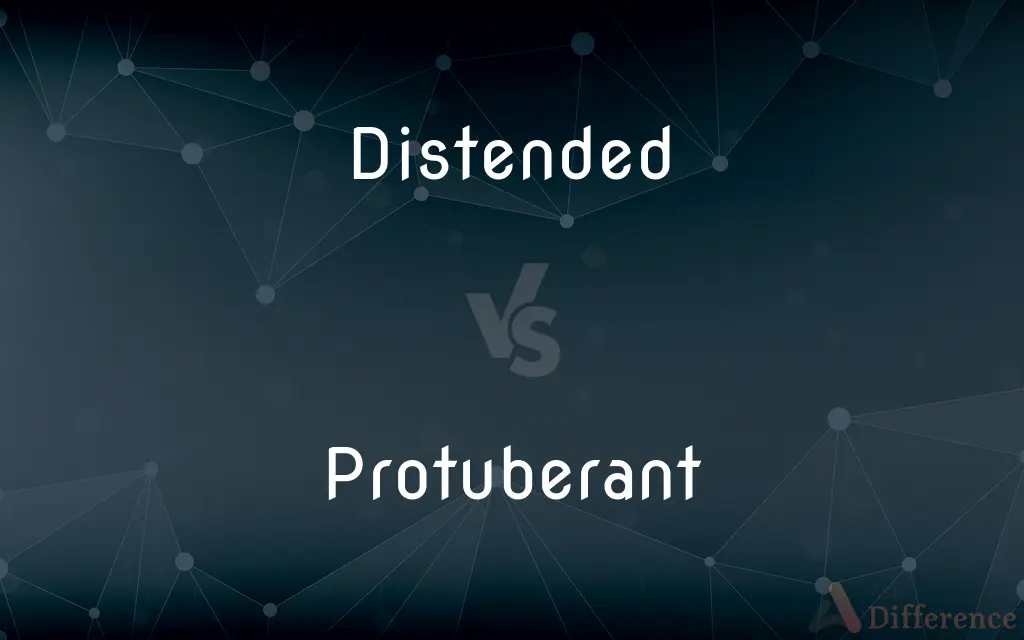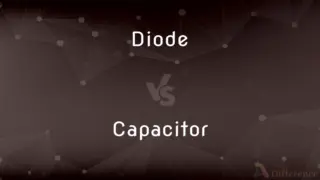Distended vs. Protuberant — What's the Difference?
By Fiza Rafique & Urooj Arif — Updated on March 18, 2024
Distended describes swelling or expansion from pressure within, while protuberant refers to something bulging outward prominently.

Difference Between Distended and Protuberant
Table of Contents
ADVERTISEMENT
Key Differences
Distended is used to describe an area that has been stretched out or expanded, usually as a result of internal pressure, such as a balloon filled with air or a stomach swollen from overeating. On the other hand, protuberant specifically refers to something that bulges out or protrudes in a noticeable way, like a belly that sticks out.
While distention often implies an abnormal or uncomfortable expansion, suggesting something is beyond its natural size due to pressure or buildup, protuberance suggests a more natural or inherent outward bulging, not necessarily linked to discomfort or an abnormal state. For instance, a distended abdomen might indicate medical concern, whereas protuberant eyes could be a natural genetic trait.
In medical contexts, distended is frequently used to describe body parts that are swollen due to causes like fluid retention or gas, conveying a sense of stretched or bloated appearance. Protuberant, while also used medically, often describes parts of the body or growths that naturally extend outward, emphasizing their prominence or projection from a surface.
The term distended is often associated with a temporary condition that can be relieved or treated, such as a distended bladder. Protuberant, however, may describe more permanent features or conditions, such as protuberant teeth, indicating a lasting or inherent characteristic rather than a temporary state of expansion.
Distension can occur in various parts of the body and objects, indicating a uniform expansion in response to internal pressure, without a specific direction of protrusion. Protuberance, conversely, implies a specific directionality of the bulge or protrusion, often observed in growths, features, or objects that extend outward from a general surface.
ADVERTISEMENT
Comparison Chart
Definition
Swelling or expansion from internal pressure.
Bulging outward prominently.
Implication
Often suggests an abnormal or uncomfortable condition.
Suggests a more natural or inherent bulge.
Use in Medical Context
Used to describe swollen body parts due to fluid, gas, etc.
Describes body parts or growths that naturally extend outward.
Nature of Condition
Temporary and can be relieved or treated.
More permanent or inherent features.
Directionality
Uniform expansion without specific direction.
Specific outward bulge or protrusion.
Compare with Definitions
Distended
Refers to parts of the body swollen due to internal factors.
The patient's distended stomach was examined for possible causes.
Protuberant
Can indicate normal or abnormal outward growths.
The doctor noted the protuberant mole for further examination.
Distended
Indicates a stretched or bloated appearance.
The distended riverbanks threatened to overflow.
Protuberant
May not necessarily suggest a problem or discomfort.
His protuberant belly was simply a result of his genetics.
Distended
Expanded from pressure within, often suggesting an abnormal state.
His abdomen was distended due to the large meal he consumed.
Protuberant
Protruding or bulging outward in a noticeable manner.
His protuberant eyes were a distinctive family trait.
Distended
Suggests an underlying issue causing the swelling.
Her distended abdomen suggested she might have ascites.
Protuberant
Denotes a prominent bulge or protrusion.
The protuberant rock formation was visible for miles.
Distended
Implies a temporary, often uncomfortable condition.
The distended balloon looked ready to burst.
Protuberant
Often describes a natural or inherent characteristic.
The tree's protuberant roots made walking difficult.
Distended
To swell out or expand, especially from internal pressure
The puppies ate until their stomachs distended.
Protuberant
Swelling outward; bulging.
Distended
To cause to expand, especially from internal pressure; dilate
Fluid distends a blister.
Protuberant
Swelling or bulging outward.
Distended
Extended or expanded, as from internal pressure; swollen.
Protuberant
Prominent, or excessively prominent; bulging beyond the surrounding or adjacent surface; swelling; as, a protuberant joint; a protuberant eye.
Distended
(biology) gravid.
Protuberant
Curving outward
Distended
Simple past tense and past participle of distend
Distended
Abnormally distended especially by fluids or gas;
Hungry children with bloated stomachs
He had a grossly distended stomach
Eyes with puffed (or puffy) lids
Swollen hands
Tumescent tissue
Puffy tumid flesh
Common Curiosities
Can distension be a sign of a medical problem?
Yes, distension can indicate medical issues, especially if it's due to fluid accumulation, gas, or other internal pressures.
Is distended always related to discomfort?
Distended often implies discomfort due to the abnormal stretching or bloating, but the degree can vary based on the cause.
What is protuberant?
Protuberant describes something bulging or protruding outward in a noticeable manner, often naturally or inherently.
What does distended mean?
Distended refers to something that has been expanded or swollen from pressure within, often indicating an abnormal state.
Are protuberant features always natural?
While protuberant features often refer to natural or inherent characteristics, they can also describe abnormal growths or protrusions.
Is a distended stomach always serious?
A distended stomach can be a sign of various conditions, some serious and others less so, depending on the underlying cause.
Do protuberant eyes indicate a health issue?
Protuberant eyes can be a natural genetic trait or indicate health issues like thyroid disease, depending on other symptoms.
How can I tell if something is protuberant?
If it noticeably bulges or protrudes outward from the surrounding area, it can be described as protuberant.
Can distension be treated?
Treatment for distension depends on the cause, ranging from dietary changes to medical interventions.
What's the difference between distended and swollen?
Distended specifically refers to expansion from internal pressure, while swollen is a broader term that can include external factors.
How are these terms used outside of medical contexts?
Distended can describe anything stretched by internal pressure, while protuberant describes any prominent bulge or protrusion, including in landscapes or objects.
Can both terms be used in medical contexts?
Yes, both terms are used medically: distended for swelling due to internal factors, and protuberant for natural or abnormal protrusions.
Can objects be described as protuberant?
Yes, objects can be described as protuberant if they have a prominent bulge or protrusion.
Are distended and bloated the same?
Bloating often refers to a feeling of fullness or swelling in the abdomen, while distended refers to actual physical expansion.
Can both terms apply to the same condition?
Yes, in some cases, a part of the body may be both distended and protuberant, depending on the perspective and context.
Share Your Discovery

Previous Comparison
Diode vs. Capacitor
Next Comparison
KB vs. MBAuthor Spotlight
Written by
Fiza RafiqueFiza Rafique is a skilled content writer at AskDifference.com, where she meticulously refines and enhances written pieces. Drawing from her vast editorial expertise, Fiza ensures clarity, accuracy, and precision in every article. Passionate about language, she continually seeks to elevate the quality of content for readers worldwide.
Co-written by
Urooj ArifUrooj is a skilled content writer at Ask Difference, known for her exceptional ability to simplify complex topics into engaging and informative content. With a passion for research and a flair for clear, concise writing, she consistently delivers articles that resonate with our diverse audience.














































